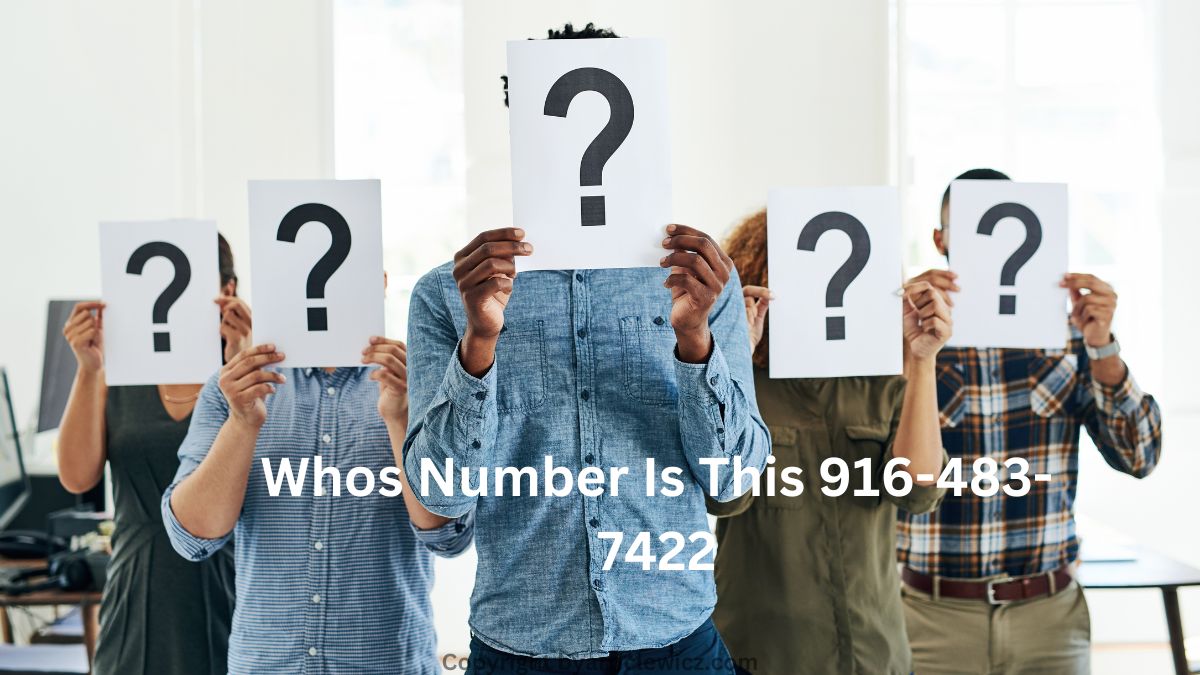Whos Number Is This 916-483-7422: Everything You Need to Know

Introduction
We’ve all been there – you get a name from a circle of people you don’t understand, like 916-483-7422, and you also wonder whose number it is? It’s tempting to ignore the call, but the interest kicks in and you may even start to stress. Is this a scam? A friend in need? Or maybe just harmless telemarketing? In this article, we will take a deep dive into this mystery. We will explore the way to find out who is at the back of this variety, what dangers we fear and what you could do when you are confronted with such conditions.
- Introduction
- What does the area code 916 mean?
- Origin 916-483-7422
- Possible Reasons Why we are Calling you at 916-483-7422
- How to find out Whose Number it is
- Is 916-483-7422 Secure or a Scam?
- What Should You Do When Someone Calls you?
- How to Effectively Block Unwanted Calls
- Ways to report suspicious calls
- How to protect your privacy online and offline
- Conclusion
- Frequently asked Questions
Before we dive into the information, let’s start with a structured table of contents that will give you a road map for this guide.
What does the area code 916 mean?
The 916 area code is a smartphone area code in California that primarily serves the Sacramento area and its surrounding areas. Established in 1947, it is one of the authentic place codes and has rich records. Over time, it adapted to the developing population and technological improvements in the locality. Sacramento is not the simplest capital city of California, but also a center of political, financial and social sports.
Understanding that the name from the wide variety of 916 probably comes from this well-known area provides initial clues to approximately the caller’s location. These basic records can be a starting point for determining whether or not the decision will be from a valid supply, such as a nearby business or an acquaintance who lives in or visits the area.
Origin 916-483-7422
The default location 916-483-7422 can be traced back to any of a wide variety of individuals, organizations or automated systems operating in the Sacramento location. Local telecom operators assign these numbers randomly to many clients, which can vary from large companies to private citizens. Without searching, you wouldn’t recognize if it is related to a service presenting organization, a government agency, or an actual person. Think of smartphone numbers like residential addresses: while understanding the general area based on the proximity code, you’ll determine the exact delivery requirements for further research. This step is especially important when determining whether a row is safe to interact with or whether it could undoubtedly be used for malicious purposes such as fraud or spam.
Possible Reasons Why we are Calling you at 916-483-7422
There are several situations in which you could receive a call from 916-483-7422, and it’s important to keep these options in mind to better understand the situation:
- Personal Contact: Someone you already know, such as a friend, family member or acquaintance, is probably calling from the Sacramento area. Maybe they’re using a new or borrowed range, that’s why it’s weird.
- Business or Service Provider: Businesses, whether near or across the country, use numbers from various areas, including Sacramento, from time to time for customer service, appointment reminders, or promotional giveaways.
- Telemarketing or Robocall: Companies often use unique prefixes for their automated marketing structures. These robocalls may come from known area codes to increase the likelihood that you will receive the call.
- Scam call: Scammers regularly mask their calls with area codes to make them look legitimate. These calls can vary from bogus charity solicitations to IRS or banking scams.
By thinking about these options, you can process the call logically and avoid unnecessary panic.
How to find out Whose Number it is
Finding out who is calling from 916-483-7422 can be done using many effective methods. The first step is to use online cell phone research offers such as Whitepages, Truecaller or Spokeo. These structures allow you to enter a wide range of cell phones and test whether it is linked to a specific individual, business or organization. They often offer person-reported records as well, along with whether the quantity is associated with spam or fraudulent activity.
Another way is to contact your phone service provider. Maybe they would offer information or have alternatives to discover and filter such calls, especially if you get them regularly. Social media structures can also be beneficial as some people and agencies hyperlink their contact numbers to their profiles. Finally, asking friends and family if they understand the wide range is an easy but effective way to find out if someone in your social circle is.
Is 916-483-7422 Secure or a Scam?
Determining if 916-483-7422 is safe requires careful research. One approach is to start with the help of entering various engines such as google and community telephone number databases such as WhoCallsMe or Report Scams. These websites collect feedback from people, allowing you to see if others have labeled the strain as a scam or if there are any reviews of legitimate business practices associated with it.
If you find that a wide range has been mentioned for suspicious entertainment, such as fraudulent bank calls or IRS calls, it’s great to block them immediately. On the other hand, if the quantity indicates that it is a part of a reputable business or provider company, you can phone verify and return a decent assortment of corporations listed on their internet site (in no case the unknown kind promptly). This cautious approach ensures that you don’t fall victim to potential scams.
What Should You Do When Someone Calls you?
When you get to the name of 916-483-7422 it is wise to live cautiously. First, let the decision go to voicemail. If the caller has a legitimate business, they will likely send you a detailed message with their name and purpose for contacting you. If the voicemail seems authentic, you can choose to call back using verified touch statistics of an individual or business instead of answering directly.
If no voicemail is left or the message sounds suspicious, such as a request for non-public records or an urgent fee, it’s safer not to respond. In such cases, using an online opposite search device to collect more information is essential. Remember, it is better to be cautious and protect your privacy than to take unnecessary risks.
How to Effectively Block Unwanted Calls
Blocking unwanted calls like 916-483-7422 is easy for today’s generation. You can block numbers from the call list without delay on the maximum number of smartphones. Simply faucet on the number and select the block option. However, if you catch regular spam calls, it may be more effective to use verified apps like Hiya or RoboKiller. These apps offer advanced features such as scam call detection, spam blocking and robocall filtering.
Additionally, they offer a net score gadget in which customers document suspicious numbers, making it less complicated to detect capability threats. Alternatively, your smartphone carrier may provide call blocking services that are occasionally included in your plan. These offers help create an additional layer of security against unwanted communications.
Ways to report suspicious calls
If you’ve noticed that 916-483-7422 is a scam, it’s important to document it to help others avoid the same trouble. You can start by submitting a complaint to the Federal Communications Commission (FCC) that offers scam and abusive calls. Another option is to report the amount to the Federal Trade Commission (FTC), especially if the call involves any economic fraud or consumer protection issues.
Online reporting tools such as WhoCallsMe or community forums are also helpful; allow customers to share stories and alerts about scam numbers. Reporting suspicious calls will not only help you; it creates a safer phone environment for all of us by expanding the collective expertise of dangerous numbers.
How to protect your privacy online and offline
Protecting your privacy can greatly reduce your chances of receiving unwanted calls like those from 916-483-7422. The first step is to use call blocking apps that robotically check and block suspected spam numbers. Another effective measure is to be cautious about sharing your smartphone assortment – it’s most skillful to give it to agency dependents and individuals. You can also register your number in the National Do Not Call Register.
This registry restricts telemarketing calls and supports your privacy. Additionally, securing your online stats by avoiding suspicious websites, using strong passwords, and monitoring your online hobby can prevent your contact information from being misused. By treating different types of phones as non-public information, you reduce the risk and keep unwanted callers at bay.
Conclusion
Receiving a call from 916-483-7422 might seem alarming, but with the right method, you could take care of it appropriately and properly. Based on professional preferences, use of online devices and protection of your privacy, you can decide if the number is trustworthy or if it is capacity undermining. Always remember to remain cautious and take steps to confirm unknown numbers before engaging.
Frequently asked Questions
What is the area code for 916?
Area code 916 serves the Sacramento region of California. It is a long-term nearby code used for both private and commercial business calls.
How do I find out who called me from 916-483-7422?
You can use an online research tool like Whitepages or Truecaller to find out who this wide range belongs to.
Is 916-483-7422 a scam number?
It’s viable, but not certain. Explore with research offers and spot fake reviews sooner than you might think.
How do I block unwanted numbers like 916-483-7422?
You can block a wide variety right on your phone, use name blocking apps, or touch your service for help.
What should I do if I suspect a call from 916-483-7422 is a scam?
Now do not solve or measure any personal statistics. Report the number to the FCC, FTC, or use the web platform to flag it as suspicious.




